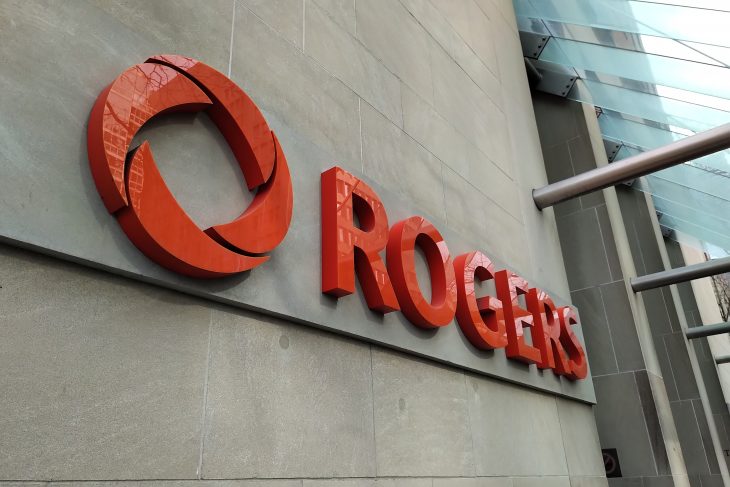
Telecom policy must encourage investment, says Natale
TORONTO – Rogers Communications CEO Joe Natale invoked the founder Friday morning while delivering a speech simultaneously to shareholders at its annual general meeting – and to policy makers in Ottawa.
The presentation at company headquarters in Toronto featured a long ago video of the first cellular phone call in Canada – made on what was called the Cantel network (Ted Rogers was famously rebuffed by his board of directors in 1983 when he wanted $500,000 to invest in mobile wireless technology, so he went it alone with his own money in launching Cantel) between then Toronto mayor Art Eggleton and Montreal mayor Jean Drapeau in 1985. Rogers staged a huge public event for the call in Nathan Phillips Square to celebrate.
In a line that garnered a few guffaws from those in attendance this morning, the reporter in the video noted how these new fangled phones could easily be slung over your shoulder for portability…
Anyhow, Natale’s point was how far Rogers has come and how much the company has invested and grown since Ted founded the company with a single radio station in 1960. He also noted the level of investment the company has made over the years in its wireless and wired networks, especially over nearer term – and how the overall Canadian economy depends on Canada’s top notch networks.
“Over the past 35 years, we have invested over 30 billion dollars in wireless,” Natale said during the speech. And those investments in the various generations of wireless tech has helped transform not only Rogers but other industries as well, like banking, which, if you’re old enough, will remember it was once something you had to do between the hours of 10 a.m. and 3 p.m. Monday to Friday at your branch. Now, you can bank 24/7 from anywhere with an Internet connected device.
As well, carriers are simply never done upgrading. 5G is coming – as will more Gs after that. “Our networks are a living, breathing, organism, and they need constant growth and investment,” said Natale in the speech.
This is all why Canada needs “the right regulation” and “the right partnership with government,” he added, noting the race to 5G is not between companies, but between countries, “and we want Canada to be first,” he said.
While Natale didn’t use his speech to directly reference the ongoing CRTC review of the wireless market, or the proposed directive to the CRTC or the overhaul of the Broadcasting, Telecommunications and Radiocommunications Acts, we asked him in an interview after his speech about all three – and what Rogers is trying to get across to a federal government and Regulator which seems poised to mandate MVNOs and is clearly rethinking the long-held and long-defended policy of making sure competition is facilities-based.
“So, you’re saying the regulatory landscape is not 100% clear,” he asked?
While most will agree Canada has some of the best wired and wireless networks in the world covering a vast territory where despite that, 99% of the population is still covered by LTE on the wireless side, the battle with consumers and government is on the retail price.
“We’re aligned on the destination, the question is what are the different levers and mechanisms to get there.” – Joe Natale, Rogers
“When I speak to stakeholders in government, it feels like we’re really aligned on what are the principles,” said Natale in our interview. “Nobody wants to lose ground on the digital future and 5G and what it could bring to Canada – and we’re all fully aligned on creating more affordability for Canadians through bigger plans, lower prices and more affordable handsets… We’re aligned on the destination, the question is what are the different levers and mechanisms to get there.”
As most are aware, Canadians and their politicians are convinced wireless prices are too high here as compared to the rest of the world and the only way to bring them down is more competition – and since it’s all but certain no other companies will go to the massive expense to buy spectrum and build more towers to create brand new facilities in order to compete, mobile virtual network operators who sell wireless service while riding on an incumbent’s networks have been touted as the salve to  cure the price problem.
cure the price problem.
While MVNOs may well drive retail prices down, that comes with a cost, said Natale. “The track records of MVNOs in different parts of the world has been spotty,” he added. “In places were it has led to heavily discounted prices, and to far lower investment, it’s really hurt network quality.”
If incumbent networks are forced to share space with MVNO providers, the argument is those incumbents may well curtail investments. When asked if Rogers would do that, should policy changes mentioned above come to pass, Natale wouldn’t say definitively.
“We would continue to look to make the right moves and investments given the environment or landscape that is ahead of us (and) continue to point out what is the right balance of decision making and policy to get us there.
“I think we have to keep pressing the gas and building on the capability and work our way through these issues one by one,” Natale continued. “Part of the responsibility for the stewardship of this company is to make the right long term and short term investments and not be swayed by something that could be temporal, or could not happen at all, or might happen in a manner that’s fundamentally different from how it’s happened anywhere else in the world.”
“It’s not a black and white issue. We agree philosophically, directionally, now we’re debating what is the right execution approach.”



